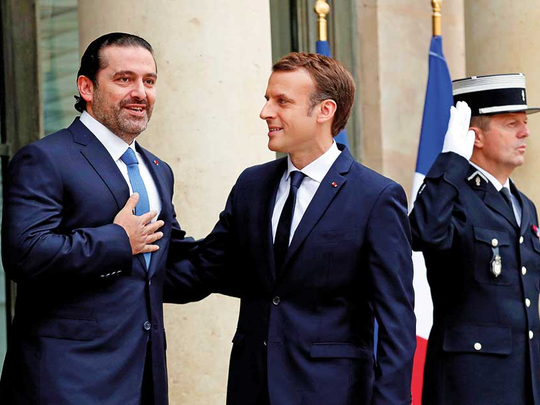
Paris: From mediating in the crisis in Lebanon to defending Iran’s nuclear deal, President Emmanuel Macron aims to fill the vacuum left by an isolationist America to boost France’s clout in the Middle East.
On Saturday, Macron hosted Lebanese Prime Minister Sa’ad Hariri for talks aimed at trying to resolve the crisis triggered by Hariri’s shock decision to resign on November 4.
Hariri’s announcement, which he made in Saudi capital Riyadh, was seen as a serious escalation of the regional battle for dominance between Saudi Arabia and Iran.
Into the fray strode Macron, who was elected this year on a promise to restore France’s international standing after years in which, in the Middle East particularly, the former colonial power had looked increasingly irrelevant.
“Macron is extremely opportunistic and is filling the void left by the US and the UK in the Middle East, positioning France as a playmaker in the region along with Russia,” said Olivier Guitta, the managing director of GlobalStrat, a geopolitical risk consultancy firm.
France had mandate power over both Lebanon and Syria during the first half of the 20th century but its influence in the two countries has waned in recent years, in tandem with France’s economic decline.
By inviting Saudi-backed Hariri to Paris, holding telephone talks with the leaders of the US, Saudi Arabia, Israel and Egypt, and announcing a visit next year to Iran, Macron hopes to re-establish France as a key player in the region.
“It’s important to talk to everyone,” the 39-year-old politician, a rookie in diplomatic terms, said after a surprise visit to Riyadh on November 10.
Frederic Charillon, a professor at Sciences Po university in Paris, said France’s youngest ever president stood to gain from even modest advances.
“If France allows the least diplomatic progress it will regain prestige it lost in the region in recent years and strengthen its position in future negotiations on Syria,” he wrote in Lebanon’s L’Orient le Jour newspaper.
But by trying to court all sides, he risked drawing a blank with one of them, Charillon warned.
Success in Lebanon would burnish his reputation as a consummate negotiator, four months after he got Libya’s rival leaders to agree to a conditional ceasefire at talks in Paris.
Some observers have, however, expressed scepticism about France’s ability to play a leading role in the Middle East, where the US, Russia and their allies have traditionally called the shots.
Hazem Hosni, professor of political science at Cairo University, said he believed France’s influence would remain limited to its former mandates and colonies in French-speaking Lebanon, Tunisia, Algeria, Morocco, and, to a lesser extent, Syria.
France’s diplomacy is “in the historical context of France’s presence in these areas,” he said.











